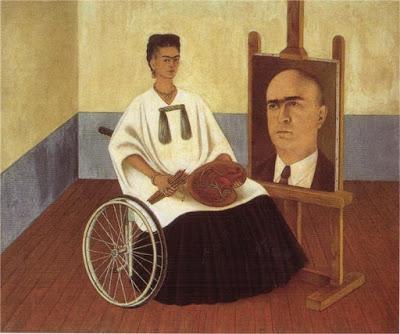
Self Portrait with the Portrait of Doctor Farill by Frida Kahlo*
As I was reviewing all the information that we have shared with you over the years on our blog regarding yoga for medical conditions, I was struck by the fact that I had not clearly and unequivocally stated the most obvious caution of all. It was easy to forget this most important caution when there is so much positive information coming out each week on studies showing yoga’s benefit for a wide range of medical conditions, from osteoporosis to Parkinson’s Disease and post-cancer treatment. I’ve even shared with you fairly clear ways to think about the use of yoga tools for medical conditions- as preventative, curative, maintenance, supportive or palliative, and rehabilitative (see 5 Ways Yoga Can Affect Your Health). And we have written about applying yoga tools for conditions here ranging from bunions to low back pain and diabetes.But there is one caution that is crucial for all of this:
If you feel that you are developing some medical condition or illness, you should be evaluated by the appropriate health care provider—be it an orthopedic surgeon for your shoulder pain or a psychologist for your feelings of depression—and get an accurate diagnosis!This might seem like common sense. And yet, over and over again, I meet people who are using yoga to address a health issue who have never even been to their family doctor, let alone a specialist, to find out if their suspicions about what is going on are correct. There is an old saying “The doctor who treats himself has a fool for a patient.” You are doubly or triply foolish if you are not a doctor and doing the same thing! Also, despite their best intentions and offers of help, your yoga teacher is not trained nor licensed to diagnose what ails you, even common things like low back pain that might seem their bread and butter. Even those who are certified in the new field of yoga therapy are not permitted to diagnosis your injury, illness or disorder (see Drawing a Line in the Sand: Where Yoga Teachers Should Not Go).
I certainly understand the reluctance of many to go see a doctor when you may not have health insurance, or have a plan that covers very little of the cost that might be involved in finding out what is going on. But a delay in finding out what is going on or making an incorrect self-diagnosis could leave you worse off in the long run and cost you even more. So, here is what I recommend:
- If you think you are becoming ill (obvious exceptions are common colds and such), see a board-certified medical doctor doctor as soon as you can and get an accurate diagnosis.
- If you are injured and are not improving in 4-6 weeks, do the same.
- Once you have a diagnosis, ask your doctor or health care expert if yoga is safe to add to any treatment they recommend (see Talking to Your Doctor).
- Once you have a diagnosis, discuss what you know about your condition with your yoga teacher or yoga therapist, and ask them to help you craft a plan using yoga to assist in supporting better health and healing.
- If you don’t already have a teacher or yoga therapist, look for one in your community with experience, preferably working your specific diagnosis.
- Once you have a diagnosis and clearance from your health team, consider using the recommendations we make here on this blog for your specific issues. But even if you choose to try out some of our suggestions, I still strongly recommend you work with a teacher or yoga therapist when you first start our applying yoga tools, especially if you are newer to yoga.
- If you are in the midst of a diagnostic work-up and your doctor is okay with you trying or continuing restorative or gentle yoga, then certainly, with appropriate common sense caution, do that. The stress reducing benefits of such practices are typically supportive for just about any condition you might be diagnosed with.

